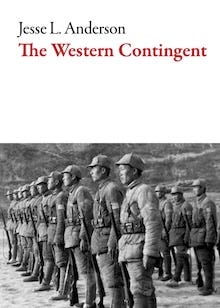"Reading Sébastien Brebel" by Jesse Anderson
A Dalkey French author I have not read.
For today’s post, I thought I would build out my French obsession by including a piece about an author I’ve never read from a translator-writer who John O’Brien greatly respected.
The first time I clocked Sébastien Brebel’s name was while unpacking all of the boxes containing the bulk of Dalkey’s library. It was a name that was new to me, and caught my eye due to the fact he isn’t mentioned in any of Warren Motte’s books on new French literature—my go-to sources for information on the most exciting voices in contemporary French literature.
John never mentioned Brebel to me, but he did mention the translator: Jesse Anderson, whose novel, The Western Contingent, John was very excited to publish, referring to Anderson as a great writer and excellent translator.
I have read The Western Contingent (it’s great! I’ll run a sample from it later this week), and based on that—along with the piece below—I’m now very intrigued by Brebel . . . which is one of the points of CONTEXT magazine: generating interest in fascinating authors who have flown under the radar.
More to come on Jesse’s novel, but for now, here’s his piece introducing Brebel, who, as best as I can tell, has three books that haven’t been translated: Place forte (2011; mentioned below), Erre, erre (2021), and L’appartement (2023).
“Reading Sébastien Brebel” by Jesse Anderson
The world Sébastien Brebel presents in his fiction is a bleak one. Most of his characters have come to a point in their lives where existence has begun to seem either meaningless or overwhelming, and so, in a desperate attempt to make life bearable again, they find themselves obsessively engaged in some time-consuming endeavor. They tend to be isolated—physically, emotionally, or both—and their isolation is often crucially tied to the pursuit of their obsession. For Brebel, life is impossible without self-deception, and the most effective way to deceive oneself about the emptiness of life is to let consciousness be completely overtaken by some self-obliterating task.
This take on life can be seen in the opening pages of Brebel’s first book, Place forte, in the thoughts of a jaded notary driving aimlessly along a country road in western France:
Everyone’s life is comic, not vaguely or partially comic, but completely and radically comic, a hopeless comedy devoid of nuance.
And on the next page:
Because it’s not enough to simply act in the comedy, it’s also necessary to hide from ourselves that we’re acting, it’s necessary to render ourselves indifferent and perfectly ignorant, necessary to employ exorbitant intellectual and moral powers to hide our very own game from ourselves.
In Place forte, a nameless notary (unless there’s some humor or irony to be extracted, Brebel rarely reveals the names of his characters) accidentally hits a dog with his car. The injured dog gives the notary an opportunity to focus on something other than the morbid cycle of his thoughts; it offers temporary relief from the onslaught of existence, and the notary soon becomes obsessed with finding treatment for the animal. He finds a vet’s office in a small town, but the veterinarian’s wife is there alone: the veterinarian, she explains, has become obsessed with the mass extermination of cows in the region, where they’re currently in the midst of a bovine epidemic. He leaves the house each morning in a state of euphoria and returns home late each night delighted, looking forward to the next day’s slaughter. She can’t understand his change of mood, but in Brebel’s world there is nothing surprising about the veterinarian’s obsession. He has his cows, the notary has his injured dog; both have found respite from the vacuity of life.
The search for a veterinarian then leads to an isolated farm, where the notary finds himself at the scene of a suicide. Without a word of introduction, the farmer’s wife insists on recounting her story, which is, as one might expect, a story of obsession. What the notary and the vet have only dabbled in, the farmer perfected, living inside his dual obsession with farming and German literature. There are rarely permanent solutions in Brebel, and after several decades the veil the farmer had thrown over reality begins to tear. Suicide was his last available option.
Brebel’s second book, Francis Bacon’s Armchair, is his most elusive. While the familiar elements of obsession and isolation can be found throughout the novel, they serve as a backdrop rather than as the driving force of the story.
The book’s unnamed narrator has recently been released from an insane asylum and has decided to isolate himself in an eleventh-floor apartment in order to meditate and decide what to do next with his life. After several days of self-imposed isolation, the narrator becomes restless and rushes out of his apartment. He knocks on a door he feels instinctively drawn to, two floors down, where he has his first encounter with Sauvage, a morbidly obese translator who seems never to leave his armchair. Sauvage is in the process of translating The Dictionary of Rare and Incurable Diseases—he and the narrator share a preoccupation with illness—and through his work he has developed some discouraging opinions regarding language:
So many times, he says, he has felt the hopeless insufficiency of language, so many times he has described the terrible illness that hides behind each definition. Whether or not language is the bastardization of thought, he says, he is its first witness, the pure witness.
The limitations of language and the effects of language on reality are ideas that come up repeatedly throughout Francis Bacon’s Armchair. The narrator worries that “I might be misinterpreting the meaning of my own words, that what I think I’m saying is not what I’m saying in reality.” Later, while reflecting on Sauvage’s persistent silence, he thinks “it’s in silence that one must confide the secrets of one’s actions, whereas words can do only one thing: throw doubt upon the mind, corrupt the impact of our decisions.”
The narrator has the same relationship with reality as the reader does with the story. Both are mediated through language, but language is unreliable, unstable; both the reader’s experience and the narrator’s could ultimately be a delusion. It is significant that the narrator goes unnamed and that Sauvage’s name is so unfitting that he might as well be nameless. A name, after all, is how we are represented through language, and naming characters in a story about the futility of language would be hypocritical. By finishing his translation of the dictionary, the narrator says, “Sauvage had been cured of the word illness,” because to know something is “to no longer fear it.” To be cured of a word, at least in some limited way, get a hold of language and, in turn, of reality these are the ideas at the core of Francis Bacon’s Armchair.
Villa Bunker, Brebel’s third book, is narrated by an unnamed philosophy student whose parents have recently moved into an isolated seaside villa. He reconstructs their experiences in the house through letters sent to him by his mother.
For most of the book, there are only three characters in play. The plot unfolds almost entirely within the villa, giving the story a claustrophobic and constrained atmosphere. The villa’s interior is extremely complex and seems to change daily; rooms the couple is sure they’d been in one day appear to have completely transformed the next. As the weeks pass, the nature of the villa—and of reality—becomes increasingly difficult for the narrator’s mother and father to grasp. Communication between them breaks down and the mother, already isolated with her husband in the villa, begins to feel her solitude even more acutely. But her take on isolation is complicated. Writing to her son about the terrifying sound made by waves crashing below the villa, a sound which seems to disappear when she wakes up, she says:
. . . I feel much better in fact, almost relieved, writes my mother, I can imagine the villa is located in the middle of the desert, in the midst of a desolate landscape, out of reach, I can convince myself that the villa is in no way threatened by the waves; we’re in the middle of nowhere, a barren expanse, sand stretches as far as the eye can see, and the silence is total; for days on end, the crashing sound disappears and a worrying silence, perhaps just as terribly heavy and oppressive, pervades the place in its absence.
The relief the mother feels by imagining the villa even more isolated than it already is, “in the midst of a desolate landscape, out of reach,” quickly morphs into another source of anxiety, one that may be “just as terribly heavy and oppressive” as the waves. An initially comforting thought has been turned inside out and revealed to be as frightening as what prompted it. Similar types of inversion occur frequently throughout Brebel’s fiction.
As the story proceeds, the narrator’s father becomes increasingly obsessed with the villa’s renovation and ends up locking himself away, in a room at the top of one of the villa’s towers. The mother, left on her own in the immense structure, pursues her own obsession. Gardening starts out well but, like the comforting thought of the villa in the desert, soon turns on her:
She’d developed a hypersensitivity to smells, and she’d begun to fear that each plant’s fragrance was delivering a coded message, the toxicity of which was growing by the day, or perhaps hour. It wasn’t long before the sight of the lush indoor plants had become a negative influence . . .
The narrator himself has his own obsession, a dissertation on Foucault, “an idée fixe that had wound up killing any sympathy I might’ve had for the world, and which in the end had cut me off from the world.”
Toward the end of the book, the house finally offers the mother a potential distraction (and obsession) in the form of an unexpected visitor, and the mother soon succeeds in drawing consolation from her discovery. But, of course, she should be wary of her own motivations. As the narrator reminds us early on in the novel, and as Sébastien Brebel makes clear throughout his fiction: “Self-deception is the goal of every undertaking.”
Brebel’s most recent book, A Perfect Disharmony, is a collection of stories, but the book maintains a fluidity of mood and atmosphere that at times makes it feel more like a novel. Every story centers on either a woman or a man’s obsession with a woman, and certain details are repeated throughout the book, adding to the collection’s sense of unity. As in Brebel’s earlier books, isolation and obsession propel most of the stories, but what is most worthy of attention in A Perfect Disharmony isn’t its themes but its experimentations with form—indeed, the book serves as a healthy reminder to Anglophone readers of the versatility of the short story.
The stories in A Perfect Disharmony contain only limited amounts of action. Brebel fills his stories with details, returning only sporadically to the situation presented at the beginning of the story. At first glance, many of the details could be considered superfluous to the story, but it is through the accumulation of these details that the character’s limited action in the story takes on great significance for the reader. Here’s a passage typical of A Perfect Disharmony:
She’s lost her interest in the seasons, in trees and in rainbows, she doesn’t think about how old she is. She remembers that when she arrived here there were other houses in the area, but she doesn’t wonder what’s become of their occupants. For the most part, she’s uninterested in her past. She experiences no desire to express her thoughts or to be listened to. When she talks in her sleep she says words whose strange beauty would astonish her.
Brebel’s details tend to have an unforced quality about them that, in turn, gives his stories a strong sense of naturalism; they feel like random thoughts crossing a character's mind or the disinterested observations of a third party, not the contrived details of a writer trying to push forward a plot. Brebel also gives a great deal of attention to his characters’ imaginations, to their dreams, daydreams, and fantasies—things that many writers would dismiss as aimless digressions. By allowing these detours into his characters’ minds to take over the narration, Brebel gives his characters a dimension of complexity absent from most fiction.
“Reading Sébastien Brebel” by Jesse Anderson in CONTEXT No. 25. Brebel’s three books translated by Jesse Anderson into English—Francis Bacon’s Armchair, A Perfect Disharmony, and Villa Bunker—along with Jesse Anderson’s novel, The Western Contingent, are all available from Bookshop.org and better bookstores everywhere.





